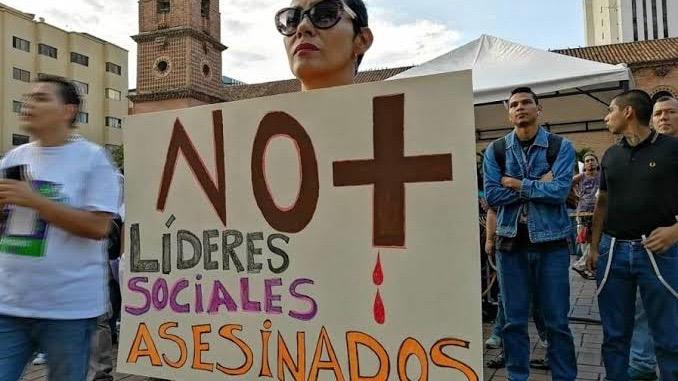The systematic assassination of those who fight for peace, human rights and structural changes continues to take place in Colombia even amid the coronavirus lockdown. During the last week, between May 25 and May 31, 3 Indigenous leaders, 2 social leaders, 2 former FARC combatants and a family member of an ex-combatant, were killed.
On May 31, 19-year-old Jhon Carlos Montaño, son of José Montaño, a former combatant of the Revolutionary Armed Forces of Colombia (FARC), was assassinated in a rural area of the municipality of Algeciras in the Huila Department, Colombia. An unidentified man fired two shots at young Jhon and killed him.
The political party Common Alternative Revolutionary Force (FARC) denounced the murder and held the national government responsible for the death. “To this date, 199 former guerrilla members in the reincorporation process and 41 family members have been killed, without any effective action taken by the Colombian State to stop this extermination. It is the responsibility of the Colombian State, the national government and its institutions to implement measures to protect the life, security and personal integrity of the entire collective in the reincorporation process, as well as their families, communities and social leaders,” said FARC party in a statement issued on June 1.
Earlier last week, on May 30, another ex-combatant from the FARC guerrilla group, Herney Betancourt Ortiz, was violently killed in the municipality of Campoalegre also in the Huila Department.
Likewise, on May 27, Manuel Olaya Arias, also a former guerrilla fighter, was assassinated in the El Diamante neighborhood in the municipality of Aipe, also in Huila, while working in the fields.
On May 26, during a virtual meeting, the FARC party requested the Inter-American Commission on Human Rights (IACHR) to take precautionary measures to stop “the systematic extermination” of all the former combatants who signed the peace agreements with the government of former President Juan Manuel Santos in 2016, in Havana, Cuba.
In addition, on May 31, Indigenous leader, Joel Villamizar, was also murdered in the Río Colorado village, in the rural area of Chitagá, in the department of Norte de Santander, in the midst of a military operation of the Colombian National Army.
A few hours after the incident, the Association of U’wa Traditional and Council Authorities of Colombia (ASOU’WA) issued a statement and denounced the assassination. The indigenous organization reported that Villamizar was the U’wa nation’s education coordinator and rejected the National Army’s announcement that the deceased was a member of the left-wing armed group, the National Liberation Army (ELN).
The ASOU’WA considered “Villamizar’s murder a violation of the International Humanitarian Law” and demanded clarifications from the national army and the national government.
The National Indigenous Organization of Colombia (ONIC) also rejected Villamizar’s murder and condemned the national government.
Last Friday, on May 29, the Association of Indigenous Councils of Northern Cauca (ACIN) denounced the murder of two Indigenous doctors María Nelly Cuetia Dagua and Pedro Ángel María Tróchez, in the Indigenous territory of Páez de Corinto, municipality of Corinto, Cauca department.
On Thursday night, the couple was violently removed from their home in the Los Andes village. The next morning, their bodies were found with bullet wounds in the village of Pueblo Nuevo.
On Tuesday, May 26, the South Bolivar, Center and South Cesar Interlocution Commission (CISBCSC) denounced social and miners’ leader, Edwin Emiro Acosta, in the Municipality of Tiquisio, department of Bolívar. According to CISBCSC’s statement, three alleged paramilitaries came to Acosta’s house, inquired if he was Edwin and fired four shots at him and murdered him.
On May 25, the president of the Community Action Board of the San Juanito neighborhood, Saúl Rojas, was assassinated in the Algeciras municipality of the Huila department. Rojas was shot by unknown armed men riding a motorcycle at his property. He died on his way to the hospital.
A report published by the Ideas for Peace Foundation (FIP) on May 24 indicated that between January and April 2020, the assassinations of social leaders increased by 53%, while the attacks on them grew by 10%.
The report also highlighted that the COVID-19 pandemic did not have an effect on the trends regarding the number of assassinations of social leaders and ex-combatants that were taking place. They continue to be the victims of attacks committed by anonymous killers.
According to the data collected by the Institute of Development and Peace Studies (INDEPAZ), between January 1 and May 31, 2020, 115 environmentalists, human rights defenders, Indigenous, peasant and social leaders, and more than 20 former combatants of the FARC were killed.
The organization reported that more than 45 of such murders happened after the government implemented the state of emergency due to the coronavirus outbreak on March 17.
Several Indigenous organizations, social movements and left-wing political leaders have condemned the government of Iván Duque for continually turning a blind eye towards this serious situation. Since Duque took office in August 2018, Colombia has witnessed an increase in right-wing violence and repression against left movements in the country.





